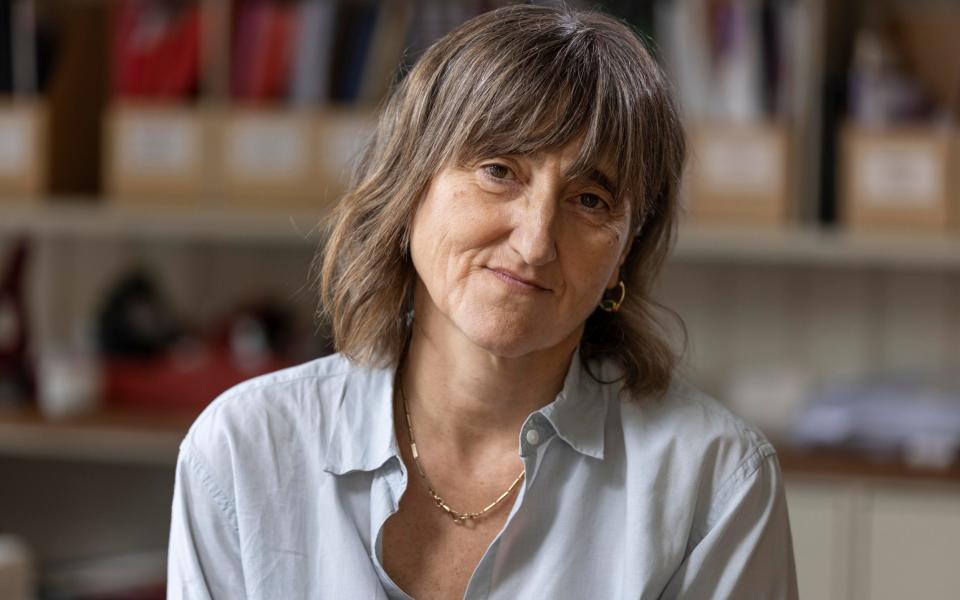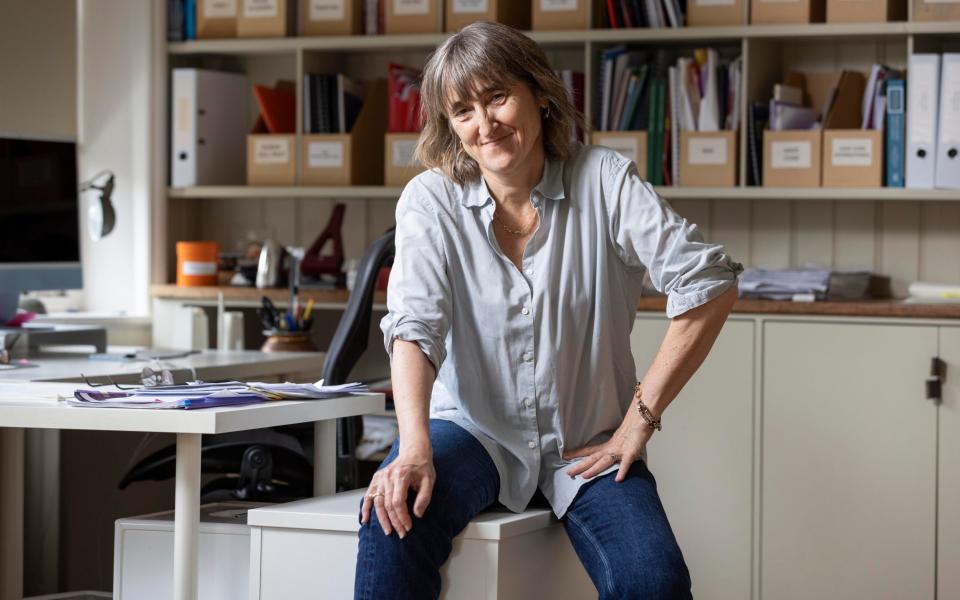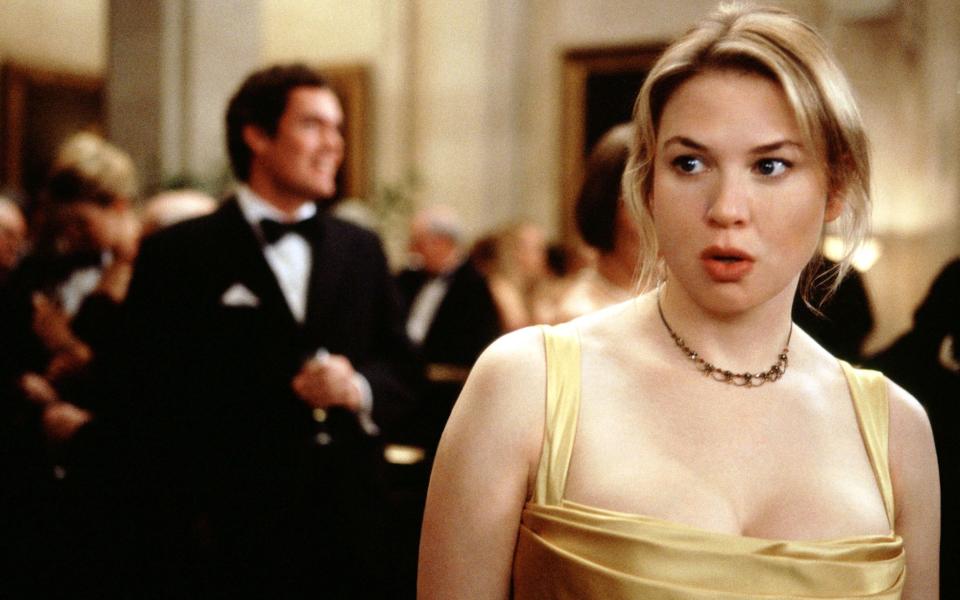‘I turned my back on my film career to protect children online’

Sitting in her airy studio office bathed in sunlight in north London, Beeban Kidron recalls the moment she decided to “ruin” her 30-year career as an acclaimed film-maker and become a campaigner for children’s rights online.
It was 2012, she says, when the cost of smartphones had dropped low enough for parents to buy them for their children – and she decided to make a documentary exploring their impact.
“All the children had changed,” she says. “I’d walk into a room full of kids and they were silently tapping on their phones. I was fascinated. I just picked up my camera and started making a documentary, which meant I spent hundreds of hours with teenagers in their bedrooms with them online.
“If they were looking at Chatroulette [an online platform that pairs strangers together at random], I would be looking at Chatroulette. If they were looking at porn, I was looking at porn. If they were going out and meeting strangers, I went with them. It was revelatory,” recalls Kidron.
But it was also shocking. The children, she says, had no understanding of how their life experiences were being “extracted” by the social media firms using design tricks to get them addicted and keep them online so they could then use that data for commercial and competitive gain.
“What cuts a hole in my heart is the number of kids stuck in ‘the loop’ who say they tried to get off,” says the 61-year-old mother of two.
“It doesn’t matter if it was a sad sight they had seen, self-harm, pornography, they could not escape. I spent time with one child who put her phone in the bin and then found herself in the rain scraping through the bin to get it in the middle of the night because she couldn’t resist the push, push, push chasing her.”
For someone who throughout her film career had championed “giving people a voice who did not have a voice,” the resulting documentary, entitled InRealLife, proved to be a eureka moment.
It opened her eyes to how she felt children were being deprived of their rights by being treated as adults online, but without the same protections. “Somewhere in me a light bulb went on,” she says.
“All of those hundreds of hours I’d spent with them went backwards like in The Matrix. I realised that the problems they were having was because the experiences they were having assumed they could make adult discriminations, that they had the adult protection of age, maturity and so on.
“I realised that technology as a sector was pursuing a regressive set of ideas, which deprived children of rights, privileges and expectations. No one would listen and I was determined – and that was it, I ruined my career. I stopped making films and I started campaigning for children to be given a fair deal online. Cut to 10 years later, this is what I do.”
It has seen the Bafta-winning filmmaker, elevated to the Lords in 2012 for her contribution to drama, become, as her husband, the playwright Lee Hall, describes it, the “middle-aged woman” taking on Silicon Valley and, so far, winning.
Her children’s code – or Age Appropriate Design Code – was introduced through an amendment to data protection legislation in 2018 putting legal blocks on the ability of social media firms to “addict” children and extract their data.
It imposed 15 standards on internet companies to make their services safer for children including offering “bite-size” terms and conditions for children; giving them “high privacy” by default; turning off geolocation and profiling; and avoiding “nudge techniques” that encourage them to turn off privacy settings.
Hailed as pioneering and one of the most impactful examples of legislation ever to target technology firms, Kidron’s code is now being implemented globally. Later this year, a US version of it is set to become law in, of all places, California, the home of Silicon Valley. Australia, Canada and EU countries are following suit.
The code was introduced in September 2020, but offered companies a 12-month transition period, to put their houses in order. It resulted in some of the largest social-media platforms, including YouTube, Instagram and TikTok introducing new safety measures for young people. Instagram instigated a new feature preventing adults from messaging people under 18 who do not follow them, YouTube said it would turn off autoplay on videos, and TikTok has implemented a bedtime for notifications; 13-15 year-olds will no longer be pinged after 9pm.
Next month the Information Commissioner John Edwards is expected to make the first legal moves against companies that have failed to abide by the code, with the power to fine firms up to four per cent of their global turnover.
But that’s not the end of the matter. This autumn Baroness Kidron will take to the trenches in Parliament to save the Online Safety Bill, an even bigger legislative measure imposing a duty of care on tech firms. It aims to protect children from “illegal” harms, such as child sexual abuse and exploitation, as well as grooming, bullying, pornography and the promotion of suicide, self-harm and eating disorders.

However, a question mark currently hangs over what form the Online Safety Bill will now take under a new Tory leader – though both Liz Truss and Rishi Sunak are committed to reviewing its approach to “legal but harmful” content to ensure it does not damage freedom of speech.
Ever since the Government introduced a new clause of “legal but harmful content” (which, according to an explanatory note could range from online bullying and abuse to advocacy of self-harm to spreading disinformation and misinformation), it has faced a backlash from anti-woke campaigners. These include Tory leadership contenders and senior MPs such as David Davis, who called it “extraordinarily controversial” and asked for it to be delayed. Its opposers fear it could allow “woke” tech firms to stifle free speech because they find it offensive and start dictating what they felt was appropriate for users.
“Creating some sort of new soft law didn’t seem necessary to us and we had a different route,” says Kidron, who sat on the Parliamentary pre-legislative committee that drew up a draft bill. “The UK already has equality legislation and laws on sexual discrimination. All you need to do is to tell the companies that we expect them to deal with these areas.
“I am hugely disappointed the Government did not respond more cleverly to the work of the pre-legislative committee because the whole phrase ‘legal but harmful’ is deeply worrying.”
She believes there is a legislative solution to unite the warring factions, safeguard free speech and provide the Bill with a safe “landing strip” that will protect children from online harms.
“Our proposals got support from David Davis and the NSPCC. The other thing that I would be at pains to say – and this is an argument many have made, I am not alone – is that they should simplify the bill,” she says.
A life in film and politics was somehow predestined for Baroness Kidron. Her London-based immigrant parents – father from South Africa and mother from Belgium – were founders of the radical Pluto Press, the publishing arm of the International Socialists.
She first took up photography after being given a camera by landscape photographer Fay Godwin (a friend of her parents) at a point when Kidron was recovering from a throat operation that left her unable to speak for a year. After her photographs were published, they attracted the attention of legendary photographer Eve Arnold who offered the 16-year-old Kidron a job as her assistant.
Four years later she enrolled at the National Film School, first as a camerawoman, before switching to directing. As the child of socialist parents (her father, Michael, was a Marxist writer), it was perhaps natural that she should chronicle one of the biggest British protests of the 1980s, at Greenham Common where she spent seven months at the women-only camp, resulting in the 1983 documentary Carry Greenham Home.
She released her first feature film, Vroom, in 1988, starring Clive Owen, but it was her 1990 TV drama Oranges are not the only Fruit that marked her breakthrough. The adaptation of Jeanette Winterson’s autobiographical novel won three Baftas but also challenged boundaries. “I think that was the first lesbian kiss on UK TV and Mary Whitehouse got very upset,” she says with a mischievous chuckle.
It underlines the point that, for Baroness Kidron, campaigning against vested interests is not that far removed from film-making, even if she may be best known for directing movie stars Hugh Grant, Colin Firth and Renee Zellweger in Bridget Jones: The Edge of Reason.

“A lot of my work before, even though the form was comedic or the tone was populist, was about giving people who did not have a voice, a voice in some direction,” says Baroness Kidron.
This included the 1995 American road comedy To Wong Foo, Thanks for Everything! Julie Newmar, which “put drag queens centre stage and said they too should be included,” she says. It was a “joyous film,” she adds, about the gay community at a time when the Aids pandemic loomed like a gravestone over it.
She shot a lot of InRealLife herself without the financial backing of a production or distribution company until she joined up with Steven Lambert, producer of the hit reality TV shows Undercover Boss and Faking It. Baroness Kidron knew she was pushing against the prevailing orthodoxy that technology was the key to the future.
“Everyone had taken the Kool Aid that tech was going to save us, that anybody who had a critique was a Luddite. And that was the politics of the moment: If you weren’t embracing technology, you were against it,” she says.
On the release of InRealLife in 2013, Baroness Kidron toured film festivals around the world and found unexpected allies for her concerns.
“It didn’t matter where I was in the world. When the lights went up, the room was absolutely packed with teachers,” she says.
“The difference between a parent and a teacher is that a teacher is all day, every day with groups of 20 to 30 kids. What the teachers were saying was: ‘We see this shift, we experience this change, we are anxious in the way you’re anxious.’
“Whereas as a parent you think your children are like this, or like that, or they did this or they didn’t do that last Wednesday. But because teachers see it [across the group], they were the quickest.”
That same year Baroness Kidron set up her charity 5Rights to promote the rights of children online, but it was still a lonely journey. “I’d got in touch with all kinds of people who should or might have been interested, but they weren’t. It wasn’t that anyone was failing, it was just not on their radar,” she says.
It was at this point her husband, Lee, screenwriter of the hit film Billy Elliot, offered a reality check. “He sat me down and said: ‘Look, you’re a really successful film director and it seems to me you’ve sort of turned your back on that to be one middle-aged woman against Silicon Valley. Are you sure?’
“Apart from the fact that it was a terrific line, I turned around to him and said: ‘Pain of consciousness, what can you do?’ So it just didn’t really feel like it was a choice.
“People have that moment in their lives on things really huge and really small. I think people who I’ve spoken to – not about this issue, but in their own lives – do understand that there are some things once you have seen them, you have got to fix them.”

The House of Lords, which she had just joined, provided the political platform for her campaigning. Coming from a male-dominated world where a female director was a “very unusual creature,” she was empowered by the women she found on the crimson benches.
“When I went into the House of Lords, it was the first time in my adult life since I left Greenham Common that I was surrounded by women who had a lot of agency, a lot of camaraderie and a sense that they could make change in the world. I found that very, very moving and inspiring,” she says.
She admits she was a “novice” in the way Parliament works and how to “make change” by amending laws, but was supported by a cross-party alliance comprising Tory peer Dido Harding, Labour’s Wilf Stevenson, the Lib Dems’ Tim Clement-Jones and the Archbishop of York Stephen Cottrell.
They helped her drive through the amendment to introduce the children’s code as part of the 2018 Data Protection Act. “I was really, really appalled that the main debate about children around the Bill was whether we put a child at 13 or 16,” she recalls. “And I was like, ‘No, hang on a minute, we are signatories to the UN Convention on Children’s Rights. The age of adulthood is 18.’”
The point is hammered home when I ask her for her worst experience in her decade of campaigning. Struggling to hold back tears, she says: “I would say looking at a child, a 14-year-old girl, at the moment she realised that she had been performing sexual acts and not for someone who she thought she loved, but for a vast group of people and that anybody anywhere that she ever met anywhere might have seen it. And the crushing of her soul.”
Indeed, one of her biggest criticisms is that legislators are too focused on online content rather than the social media firms’ product design and the way their algorithms amplify the abnormal and the extreme and fail to take account of their risk to children.
“A lot of clarity could be brought to the Online Safety Bill by expressing really clearly that the risk-assessment process is to make sure that companies are not deliberately amplifying anger or not enabling young black footballers to be humiliated and abused,” she says.
“The tech sector grew up using the American courts to make it an issue about the First Amendment rather than product safety. If you take the analogy of a car on the top of a hill. It’s got no brakes, there’s a kid at the wheel and it’s going to go down and crash. We’ve got to say if we just stop talking about content and start talking about product safety, we’d be in a much better place.”
With her passion for children’s rights undimmed, Baroness Kidron is preparing for a second decade away from the lights of Hollywood.

 Yahoo Movies
Yahoo Movies 